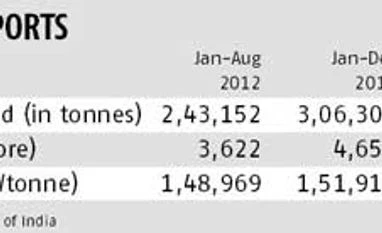At 115 cents a pound (0.45 kg) in the New York market, Arabica coffee prices have crashed below production costs, sending shockwaves across growers in India. Compared to 200 cents a pound in January 2012, the prices have fallen 43 per cent, owing to a record ‘off-year’ crop in Brazil and the continued economic crisis in the European Union, a major market for Indian mild Arabica coffee.
“The prices of Arabica have hit a low of almost a decade and are about 20 per cent lower than the cost of production for growers. Currently, the cost of production is about 140 cents a pound. There are tough times ahead for small and medium growers, as they do not have holding power or any reserves left for exports,” said Ramesh Rajah, president, Coffee Exporters Association of India. A similar situation was seen in 2002, he recalled.
During the first eight months of this year, India exported 2,35,081 tonnes of coffee, a 3.3 per cent rise compared to the corresponding period last year. In value terms, exporters earned Rs 3,485 crore, against Rs 3,622 crore in January-August last year.
Rajah said a year ago, prices stood at 150 cents a pound, which, at the least, covered production costs. This year, higher fertiliser prices and labour and transportation costs, owing to rising diesel prices, have resulted in a rise in the cost of production for small and medium farmers, who account for 70 per cent of India's coffee production.
Also, news of a bumper crop in Brazil next year has led to concern. Brazil contributed a third of the global coffee output of 48.6 million bags (of 60 kg each) this year, against 50.8 million bags in 2012.
About a year ago, Arabica prices stood at 150 cents a pound; the bearish trend started from the beginning of this year. The global economic downturn led to consumers switching from the premium Arabica to the cheaper Robusta. “A recovery in Arabica prices is unlikely in the near future; we may look for some bounce-back only by 2015,” Rajah said.
The depreciation of rupee against the dollar didn’t benefit exporters much, as they exported most of the coffee in the first six months of the year, Rajah said, adding those holding on to stocks would reap the benefit of the rupee's depreciation.
Due to the rupee's fall, farm gate prices of Arabica have risen eight per cent to Rs 6,500 a bag (of 50 kg each) in Karnataka, against Rs 6,000 a bag in May this year.
“The prices of Arabica have hit a low of almost a decade and are about 20 per cent lower than the cost of production for growers. Currently, the cost of production is about 140 cents a pound. There are tough times ahead for small and medium growers, as they do not have holding power or any reserves left for exports,” said Ramesh Rajah, president, Coffee Exporters Association of India. A similar situation was seen in 2002, he recalled.
During the first eight months of this year, India exported 2,35,081 tonnes of coffee, a 3.3 per cent rise compared to the corresponding period last year. In value terms, exporters earned Rs 3,485 crore, against Rs 3,622 crore in January-August last year.
Rajah said a year ago, prices stood at 150 cents a pound, which, at the least, covered production costs. This year, higher fertiliser prices and labour and transportation costs, owing to rising diesel prices, have resulted in a rise in the cost of production for small and medium farmers, who account for 70 per cent of India's coffee production.
Also, news of a bumper crop in Brazil next year has led to concern. Brazil contributed a third of the global coffee output of 48.6 million bags (of 60 kg each) this year, against 50.8 million bags in 2012.
About a year ago, Arabica prices stood at 150 cents a pound; the bearish trend started from the beginning of this year. The global economic downturn led to consumers switching from the premium Arabica to the cheaper Robusta. “A recovery in Arabica prices is unlikely in the near future; we may look for some bounce-back only by 2015,” Rajah said.
The depreciation of rupee against the dollar didn’t benefit exporters much, as they exported most of the coffee in the first six months of the year, Rajah said, adding those holding on to stocks would reap the benefit of the rupee's depreciation.
Due to the rupee's fall, farm gate prices of Arabica have risen eight per cent to Rs 6,500 a bag (of 50 kg each) in Karnataka, against Rs 6,000 a bag in May this year.
)